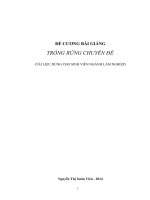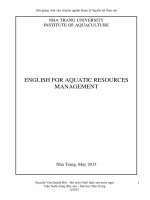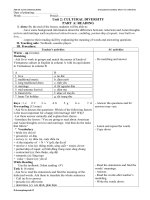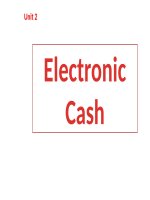unit 2 Bài giảng Anh văn chuyên ngành Tài chính Thư Viện Tài Liệu Tổng Hợp Com UNIT 2
Bạn đang xem bản rút gọn của tài liệu. Xem và tải ngay bản đầy đủ của tài liệu tại đây (158.29 KB, 10 trang )
2
AIMS:
Retail banking
To learn about: developments in retail banking, banking products and
services; key vocabulary of retail banking
To learn how to: express likelihood and probability
To practise: talking about the future of retail banking
Lead in
o What services would you expect a retail or commercial bank to offer?
o What is the difference between retail banking and investment banking?
o How do commercial banks make money?
Reading 1: Commercial and investment banking
1. Liar's Pokeris Michael Lewis's very funny book about working as an investment
banker in New York and London. In this extract, he explains why he didn't want to
become a commercial or retail banker. Read the text and explain in your own words
what Lewis is saying about:
a. commercial bankers
b. investment bankers.
... in 1934, American lawmakers had stripped investment banking out from commercial
banking. Investment bankers now underwrote securities, such as stocks and bonds.
Commercial bankers, like Citibank, took deposits and made loans .... After Glass-Steagall
most people became investment bankers. Now I didn't actually know any commercial
bankers, but a commercial banker was reputed to be just an ordinary American businessman
with ordinary American ambitions. He lent a few hundred million dollars each day to South
American countries. But really, he meant no harm. He was only doing what he was told to do
by someone higher up in an endless chain of command .... He had a wife, a station wagon, 2
children, and a dog that brought him his slippers when he returned home from work at six...
An investment banker was a breed apart, a member of a master race of deal makers. He
Unit 2: Retail banking
11
possessed vast, almost unimaginable, talent and ambition. If he had a dog it snarled. He had
two little red sports cars yet wanted four. To get them, he was, for a man in a suit,
surprisingly willing to cause trouble.
2. Find words or phrases in the text that mean the following:
a. to separate
b. generally considered to be
c. didn't want to cause trouble for other people
d. a big hierarchy of directors and managers
e. special; different from other people
f. extremely big
3. 'He lent a few hundred million dollars each day to South American countries.' This is
an exaggeration. What other exaggerations or jokes can you find in the text ?
Discussion
Which area would you prefer to work in - commercial banking or investment banking? Why?
Vocabulary 1
You are going to read a passage of Peter Sinclair, talking about retail banking. Before
you read, check your understanding of the words and phrases in the box by matching
them with their definitions [1-7].
assets
income
national income
currency
lucrative
liabilities
trend
1. a general development or change in a situation or in people's behaviour
2. all the money received by a person during a particular period
3. anything of value owned by a business; for a bank, the loans it has made
4. money that a company will have to pay to someone else one day; for a bank, its deposits
5. profitable (describes an activity that makes a profit)
6. the money earned by a country's people in a particular period
7. the money used in a particular country
Unit 2: Retail banking
12
Reading 2: Retail banking
1. Peter Sinclair presents about retail banking. According to what he says, is retail
banking in decline?
Well, I'm not sure that retail banking is declining. I think in many countries the size of
bank deposits, that's the liabilities that the retail banks have, has been growing faster than
national income - it's been rising. People are increasingly moving away from currency
towards things like bank deposits, that's a slow gradual trend and it's a trend evident in most
places, especially the more developing poorer countries, emerging economies and so on.
So I think retail banking has always been regarded as important, but perhaps a little
boring for some people. So the real action seems to be more in the big-scale operations with
large companies, in huge deals and other kinds of activity which are thought to be more
sophisticated and perhaps more rewarding than retail banking. More sophisticated yes, more
specialized yes, but not more lucrative, and often more dangerous. Retail banking I think is
not in decline; although people have been predicting that it might be at some point, there's no
evidence that it is.
2. Read again and look at the following statements. Are they true or false, according to
Peter Sinclair?
1. In the past, people used to keep more money in cash.
2. Because of retail banks, national income is increasing in developing countries.
3. Some people think that investment banking is more exciting than retail banking.
4. Investment banking is more profitable than retail banking.
5. There is more risk involved in investment banking than retail banking.
Discussion
• How has commercial or retail banking changed since the 1980s?
• How do you think it will develop in the next few years?
Unit 2: Retail banking
13
Vocabulary 2
1. Read the web page below advertising online banking, and complete the sentences .
Why
bank
online ?
Because you have access to your account 24 hours a day, 7 days a week.
With internet banking you can:
Check your balance whenever you want.
Pay bills without writing cheques or queuing at the bank.
Transfer money between your current account and your savings account.
Print a statement at any time.
Set up, change and delete your standing orders.
View and cancel direct debits.
Apply for a loan.
Apply for a new or increased overdraft.
Order foreign currency or traveler's cheques.
1. A ……………………is an instruction to a bank to pay varying sums of money to
another account on particular dates.
2. A ……………… ……………….. pays interest but usually has limits as to how much
money can be withdrawn during a certain period of time.
3. A ………………………lists the recent debits and credits in a bank account.
4. An ………………………is an arrangement allowing someone to borrow money by
withdrawing more than they have deposited in their account, up to a certain limit.
5. A ……………….. ……………….pays no or little interest, but usually allows the
holder to withdraw cash or pay cheques without any restrictions.
6. A ……………………is an amount of money borrowed from a bank for a fixed
period.
7. A …………………….is the amount of money in a bank account at a particular time.
8. A ……………….. …………………is an instruction to a bank to pay regular, fixed
sums of money to another account.
Unit 2: Retail banking
14
2.
Use a word or phrase from each box to make common word combinations. You can
use some words more than once.
apply for
the balance
cancel
a cheque
check
an overdraft
set up
a direct debit
transfer
a loan
write
money
a standing order
Reading 3: The future of bank branches
1. Read the article about retail banking from the Financial Times. What belief does the
research show to be untrue?
Banks to rely on branches to drive growth
By Jane Croft
Banks will rely on branches to drive future growth) rather than the internet, according to
new research. A study of 2,709 customers by Deloitte & Touche, the professional services
firm, showed that the bank branch is the preferred channel for 52 per cent of customers
interviewed.
Only 16 per cent preferred to bank using the telephone and 8 per cent used the internet.
The study also showed that the bank branch is preferred by 45 per cent of customers in the
affluent AB social group - contradicting the notion that sophisticated customers avoid
branches.
Nick Sandall, retail financial services partner at Deloitte & Touche, said he believed that
the main banks in the UK were planning to reverse a decade of under-investment in branches
by putting the network at the heart of their strategy.
'Although some banks, such as Abbey National, are ahead of the game in their efforts to
revolutionise the way in which they use branches to reach the consumer, we expect all banks
to invest substantially in reshaping their branch networks and the activities within,' he said.
Deloitte & Touche believed that the successful retail bank of the future needed to give
careful consideration to areas such as branch design, staffing and location.
Abbey National, .which has introduced Costa coffee shops into some of its branches,
reports that banking product sales have increased in these locations.
Unit 2: Retail banking
15
2. Which of the highlighted words and phrases in the article could be replaced with the
following?
1. decisions on types and numbers of employees
2. in advance of competitors
3. make business increase in the years to come
4. redesigning
5. spend a lot of money on
6. ten years of insufficient spending
7. wealthy
3. Read the article again and answer the following questions.
1. What have the banks not done during the past ten years?
………………………………………………………………………………………
2. What are banks expected to do in the future?
………………………………………………………………………………………
3. What has helped one bank to increase product sales in some branches?
………………………………………………………………………………………
4. Label the pie chart below
Discussion
Think about a bank's different delivery channels, or the different ways of banking.
What are the relative advantages and disadvantages of these for the customer?
Which types of customers are likely to prefer which delivery channels?
What are the relative benefits and disadvantages of the different channels for the bank?
Unit 2: Retail banking
16
Choose the correct answer:
1. …………….are people who put money into a business in the hope of making a profit.
A. Spenders
B. Borrowers
C. Lenders
D. Investors
2. The money that you borrow from a banking institution is called a ………..
A. deposit
B. loan
C. guarantee
D. commission
3. Which of the following do banks not do ?
A. print money
B. make loans
C. take deposits
D. invest money
4. When you give money to a bank, who are you?
A. a borrower
B. a lender
C. a depositor
D. a withdrawer
5. Each business hopes to make a ……….. to satisfy the shareholders.
A. share
B. export
C. profit
D. money
6. What are the two main types of bank accounts?
A. savings and current
B. savings and premier
C. savings and cheque
D. current and credit
7. Investors hope to receive ……….regularly for their invested money.
A. profit
B. pension
C. money
D. dividends
8. The bank is your ………….when it lends you money.
A. owner
B. creditor
C. debtor
D. depositor
9. These …………must be completed before the close of business today.
A. transacts
B. transacting
C. transacted
D. transactions
10. The total amount of sales in a year is called the ……….
A. expenditure
B. turnover
C. profit
D. dividends
Language focus
Likelihood and probability
1.In the Financial Times article, there are some predictions about retail banking trends
in the future. Look at the following sentences, which use phrases to show likelihood
and probability. Put the sentences [a-l] on the scale [1-5], and underline the word or
phrase that states the probability. One sentence has been done as an example.
1. certain (100%)
2. probable (>70%)
Unit 2: Retail banking
3. possible (≈50%)
4. improbable (<30%)
5. impossible (0%)
17
a. E-banking is unlikely to decrease over the next 10 years.
b. I may well decide to change banks.
c. Interest rates can't possibly stay so low.
d. There could be a takeover, but I think it's improbable.
e. Our profits will definitely increase this year.
f. Perhaps we need to hire more financial advisors.
g. Small regional banks are bound to join together.
h. They'll probably move their call centre to India.
i. Universal banks are likely to spread.
j. We certainly won't reduce the size of our counselling area.
k. We expect all banks to invest substantially in their branch networks.
l. We might increase our commission charges.
2. Can you think of any other phrases we can use for describing likelihood and probability?
Discussion
In pairs, use some of the phrases from the Language focus above to make some predictions
about the future of:
telephone banking
the stock market in your country
internet banking
interest rates in your country
branch banking
your language learning
small national and regional banks
your company
universal banking
your career
Example:
I may well go to the UK for an intensive language course next year.
Unit 2: Retail banking
18
New words:
− strip (v)
: tách ra
− repute
[ri'pju:t]
− harm
[hɑ:m]
− endless
(v)
: cho là
(n)
: sự tổn hại, sự thiệt hại
(adj)
['endlis]
: vô tận, không ngừng, lien tục
− chain (n)
: chuỗi
− command
[kə'mɑ:nd]
− station wagon
− slipper
(n)
: mệnh lệnh
['stei∫n'wægən] (n)
(n)
['slipə]
− breed
[bri:d]
− apart
[ə'pɑ:t] prep
: xe lửa vừa chở khách vừa chở hàng
: dép lê
(n)
: loại
: tách biệt, ngoại trừ , trừ ra
− master race ['ma:stə'reis] (n)
Đức)
: chủng tộc thượng đẳng (thuyết của Phát-xít
− deal maker (n)
: người giao dịch (chứng khoán)
− possess [pə'zes] (v)
: sở hữu
− vast (adj)
: rộng lớn, bao la
− snarl [snɑ:l] (v)
: gầm gừ
− hierarchy ['haiərɑ:ki] (n)
: thứ bậc, tôn ti
− lucrative ['lu:krətiv] (adj)
: có lợi, sinh lợi
− emerge [i'mə:dʒ] (v)
: nổi lên, hiện ra
− gradual
['grædʒuəl]
− decline
[di'klain]
− regard
(adj)
: dần dần
(v)
: sụt giảm
(v) có liên quan đến
[ri'gɑ:d]
− big-scale operation
− sophisticated
: (n) sự quan tâm đến, lời chào hỏi
: kinh doanh/ hoạt động có quy mô lớn
[sə'fistikeitid]
(adj)
: tinh vi , phức tạp
− evident
['evidənt]
(adj)
: hiển nhiên, rành rành
− balance
['bæləns]
(n)
: số dư , sự cân bằng
− queue
[kju:]
− transfer
(v)
: xếp hàng nối đuôi nhau
['trænsfə:]
(v/n)
: chuyển đổi
− current account
['kʌrəntə'kaunt]
(n) : tài khoản vãng lai, tài khoản tiền gửi không kỳ hạn
− savings account
['seiviη,ə'kaunt]
(n)
− statement
['steitmənt]
− standing order
(n)
['stædiη'ɔ:də]
Unit 2: Retail banking
: tài khoản tiết kiệm
: sự trình bày, bản báo cáo
(n)
: lệnh trả tiền định kỳ
19
− direct debit
(n)
[di'rekt'debit]
: ủy nhiệm chi
− to apply for
: đăng ký
− overdraft
['ouvədrɑ:ft]
− instruction
[in'strʌk∫n]
− particular
[pə'tikjulə(r)]
− withdraw
− branch
[wiđ'drɔ]
['æfluənt]
− contradict
− notion
− reverse
− ahead
(adj)
['dekeid]
(v)
: rút (tiền), rút lui
: chi nhánh
(adj)
: giàu có, thịnh vượng
(v)
: mâu thuẫn với, phủ nhận
: ý niệm, khái niệm, quan điểm
: đảo ngược, trái ngược
['ʌndə in'vestmənt]
(n)
: xa hơn về phía trước
− revolutionise
[,revə'lu:∫ənaiz]
− substantially
[səb'stæn∫əli]
(v)
(v)
(adv)
: cách mạng hóa
: về thực chất, về căn bản, lớn lao, đáng kể
: tạo lại hình dáng
− in advance of
− sufficient
: (sự) thiếu đầu tư, đầu tư không đủ
: chiến lược
(prep/ adv)
[ri:'∫eip]
(n)
: thập niên
(n)
['strætədʒi]
[ə'hed]
− reshape
: riêng biệt, đặc biệt, cụ thể
(v/n/adj)
− under-investment
− strategy
: chỉ thị, lời chỉ dẫn
(n)
[ri'və:s]
− decade
(n)
[,kɔntrə'dikt]
['nou∫n]
: bội chi, việc rút quá số tiền gửi ngân hàng
(n)
[brɑ:nt∫]
− affluent
(n)
: trước (về thời gian)
[sə'fi∫nt]
(adj)
: đủ ≠ insufficient (adj)
− unlikely (adj)
: không có thể xảy ra, không chắc có thực
− to bind – bound – bound
: buộc
− counsel
: khuyên răn, chỉ bảo
['kaunsəl]
− commission
(v)
[kə'mi∫n]
− universal bank
chứng khoán)
(n)
[,ju:ni'və:sl]
Unit 2: Retail banking
: hoa hồng, nhiệm vụ, phận sự, ủy ban
(n) : ngân hàng toàn năng (chung cho hoạt động ngân hàng và
20









